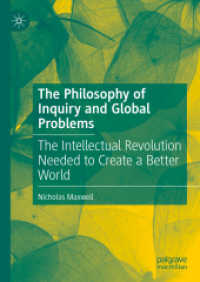- ホーム
- > 洋書
- > 英文書
- > Politics / International Relations
Full Description
International Norm Disputes: The Link between Contestation and Norm Robustness offers a rich, comparative study of when and why contested international norms decline. It presents central findings on the link between contestation and norm robustness based on four detailed, contemporary case studies - the torture prohibition, the responsibility to protect, the moratorium on commercial whaling, and the duty to prosecute institutionalized in the International Criminal Court. It also includes two historical case studies - privateering and the transatlantic slave trade.
This book provides in-depth knowledge on contestation and robustness dynamics of central international norms. Having meticulously collected relevant data and conducted extensive qualitative coding, the authors demonstrate that norms are likely to weaken when challengers contest the validity of a norm's core claims but remain robust when they contest a norm's application and contestation does not become permanent.
These important findings, comparatively presented here for the first time, are crucial for understanding the much-discussed problems of the contemporary liberal international order. The insights provided establish how different types of challenges will affect global governance mechanisms and which conditions are most likely to create fundamental change.
Contents
1: Introduction: Contestation and the dynamics of norm robustness
2: The international torture prohibition: A contested norm endures
3: The responsibility to protect: A robust but changing norm?
4: Contesting the IWC moratorium on commercial whaling: A norm weakens at the international level
5: Losing Africa? Contestation and the decline in the ICC's regional robustness
6: Bad pirates, good privateers? The surprising robustness of privateering norms
7: The Atlantic slave trade: Stabilization through contestation
8: Norm disputes: Comparative insights for theory and practice
Appendix: Coding schemes for applicatory and validity contestation







